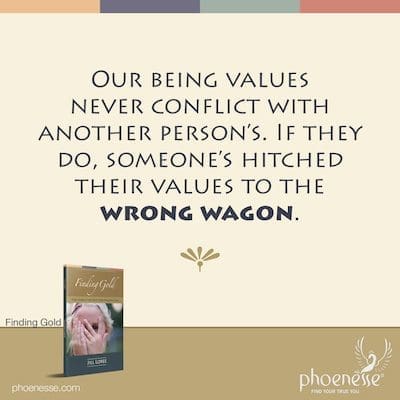There is really only one key to happiness and abundance. It is this: we must change over from an old attitude of me, me, me where we take, want, demand and won’t give, to a new attitude of loving, giving, devotion and sincerity. Easier said than done. And in fact, it is pointless to even hand someone this shiny key if they aren’t even aware of their non-giving ways. But this is the doorway we need to go through.

There are essentially two value systems governing all of us. Being values is one of them, and appearance values is the other. Let’s look at the ramifications of each.
Most of us are operating on the level of appearance value most of the time. It takes some serious investment in personal work before we start functioning for the sake of what is, and not for the sake of what it looks like in the eyes of others.
If we’ve been paying attention, we can probably guess that this is not an either/or situation. There are degrees. We may have some areas of our lives where true values prevail, and others where we are all about appearances. As always, the transition from one to the other is a gradual process.
Appearance values aim at creating an impression. In their most crass form, these values are about craving approval and selling out our truth to impress someone else. We want to be on that pedestal. We may be bold in going about this, or subtle and covert. There’s just always a subtext in the background: What will they think of me?
Just the thoughts of negative reactions from others makes us anxious. This is as insidious as it is poisonous. And it’s a big deal. It disconnects us from our own insides, from our Higher Self and from the truth of the situation. And then how can we sincerely want to get involved with others.
By tuning into ourselves from this viewpoint, we start to see this isn’t so subtle after all. And it makes all the difference in the world. Because no matter how good our efforts and goals may be, there is an insincerity. Everything is done for effect, either directly or by way of the power and money we hope will prove our value. Cha-ching.
Operating from being values, on the other hand, means we do what we do for the sake of truth—for the sake of being. So we do the best we can do and let the rest go. Others’ opinions are not the point, so the activity fulfills its innate purpose. It just is.
Or maybe we offer what we do up to God. We offer love, beauty, goodwill, comfort or something else that’s constructive and good to another person. We do this whether anyone notices the effort or the effect. It doesn’t matter if what we’re talking about here is a charitable act, a work of art, a science project or a chore like doing the laundry. What does matter is that we do it in the spirit of being, not for the sake of appearances.
Spiritual sincerity means acting for the sheer sake of what the act itself represents. We don’t try to use our work and accomplishments as a substitute for our self-value. We are giving and our giving enriches life. What we give others, we give ourselves. It’s when we’re not giving to others that we’re depriving ourselves, because this makes us incapable of receiving what the world has and wants to give us. It’s an abundant universe. We’re the ones who close the door with our not giving.
Operating on this being level changes things quite drastically. There are byproducts that cascade from the integrity of our deeper motives. It looks like this. When we feel attacked by judgment or criticism, if we’re operating from appearance values, we’ll be devastated. How could we not? If we’ve attached our self-worth to what others’ think of us, we must be annihilated whenever they see us in a bad light—even over something tiny. So we lose our inner ground. We lose our center because we aren’t centered in ourselves.
We lose sight of this when we are living in appearance values—until someone criticizes us. Sure, we seem centered as long as we’re being praised and admired. How gratifying, in that moment. But even in such moments of seeming success, there is an anxiety eating away at us. What we’re worrying about is how to shore up our uncentered state in which we get our self-value from outside ourselves. Problem is, in this case, we have zero control over our sense of self-value.
Living from a center of being values, conversely, brings deep inner security. That doesn’t mean peoples’ put-downs, judgments or unfair treatment don’t sting. But it won’t rattle our foundation. We experience the truth of our core. When operating from appearance values, our foundation shakes and even crumbles if someone looks sideways at us.

The value system we adopt has a big effect on our ability to perceive truth in others. If we’re in our giving mode, with a deeply sincere spirit, we will wholeheartedly invest all of ourselves in whatever we do. But when our heart isn’t in it, we can’t answer questions such as these: Who is right here, them or me? To what extent am I right? To what extent are others? In what areas am I right, or wrong? How about everybody else?
We might try to deny that these questions are plaguing us, but they will be there if we’re operating from appearance values. Our denials will further confuse us. They fog the issues as well as the questions, just when we were needing to sort out who we are and where we stand. This will cause us to flounder and grope, but not in a healthy way.
This is a painful struggle that tries to cover up an inner lack of security. This is what keeps eating away at our psychic guts, making us doubt everything we do and everything we think. We’ll try artificial remedies to patch the holes in our security, but they won’t be built on sound and deep self-esteem.
Real security can only come from sincerely committing and giving. We’re going to have to fumble for this too, but it will feel totally different. We don’t need to cover up honest searching. It’s beautiful and the struggle is then growth producing. We applaud this when we identify it in others.
Another thing that arises out of these two value systems is our ability to know what we want. If we’re not in connection with our innate inner selves and instead funnel all our energy outside ourselves, how can we possibly know what we want? Everything is colored by what other people think. Further, we can’t risk knowing what we want, because what if that flies in the face of what someone else wants for us? So then we need to talk ourselves into wanting their version, or whatever we think will earn us the highest points from them.
With appearance values, we’re investing in notliving our best life or living up to our potential. We’re investing in living someone else’s ideas for us. This means there are many systems of appearance values. But there’s only one being value as far as our own Higher Self is concerned, with an infinite variety of ways to express itself. And our being value can never interfere with the Higher-Self being value of another person. If there’s a conflict, someone’s got their set of values hitched to the wrong wagon.
The quality of appearance values is stiffness, rigidity, dullness and conformity. They might seem individualistic, but they lack the breath of life. When we try to get nourished from borrowed values, even when we do succeed, we end up feeling empty. But success here is going to take tremendous effort because we’re living contrary to who we really are. We end up saying something like, “I’ve invested so much, worked so hard, used so much effort trying to do all the right things—trying to please you. But I feel empty. I don’t even know who I am any more.” Ring any bells?
When we function from being values, we aren’t worried whether others approve and applaud our choices. We have the luxury of relaxing inwardly and letting our unique flag fly. This can courageously lead us to the tremendous richness of really knowing what we want. A rare treasure indeed.

If we sincerely invest the best of us in all we do, acting with integrity and giving for the sake of giving—which is the same thing as giving for the sake of God—sooner or later this incredible miracle is going to happen. Our heart’s desire will be God’s will. No more floundering in uncertainty.
But we’re not going to be able to trust, right off the bat, that our desire is good and right. Even when our values are walking straight, our desires are still not so trustworthy. We’ve been polluted for so long—like lots and lots of centuries—so that we don’t trust ourselves, even when we could. As we get more stable and less flimsy in our connection to ourselves, we’re not sure if we’re still expressing the wants of a greedy child, or the will of God.
From a place of appearance values, the will of God seems forever contrary to our desires. It’s often actually so, since we can’t really enjoy doing things we don’t really want to do. These false desires we attempt to meet don’t give us real pleasure and they are often in opposition to God’s will. And yet, sometimes these desires do seem pleasurable, especially if they’re naughty or rebellious. Or they may match God’s will, but we wouldn’t know this because we lost the thread of connection with our core—with truth.
There’s one more aspect linked with this, and it involves the creation of our lives. It has to do with the power of the word. It says in the Bible, “In the beginning was the word.” This has very deep meaning that will be helpful to understand.
The word is the first creative impulse. It expresses an intent and gives form to the intent. Creative action can then follow through. But the word carries the blueprint or plan. Whether we say it aloud or silently, there’s a ton of power in the word. When spoken affirmatively and decisively, the word is a chisel. It’s a tool that shapes and gives form to our soul substance. This is the stuff we are made of, and at the same time, we dwell in it. It both surrounds and penetrates us.
So all our thoughts and intentions have the power to create. It is with our one-pointedness—our conflict-free attitude—that we utter a word, and in that is our creative power. If we think about what’s happening when we function with appearance value, we are going to have conflict within. Because we are not plugged into our own inner source. This dilutes the strength of our thoughts—our words—which need to have strength, power and clarity to create. It’s like creating flickering lights inside ourselves where the wiring short circuits. Desires cancel each other out. We’re dead in the water.
True power comes from wholeness. Then the power of the word is enormous. And no matter what we desire to create, the word must act as creative agent to make form and shape. If we are not yet clear, especially as we endeavor to move more towards being values, we can ask and wait receptively for an answer.
When we operate from appearance values, we think so little of ourselves that we automatically underestimate ourselves. In this space, we can’t possibly consider how powerful we are. We don’t realize that our emanations—our words—can hurt or harm, or they can heal and help. But all is one. So if we are underestimating ourselves, we are really insulting ourselves. And in that case, we will harm and insult others.
But we get confused. We think that to be humble and good is to devalue ourselves. Self-value then equals pride and arrogance. Nothing could be further from the truth. If we know our own value, we will respect others. Like we said, all is one. Powerful words, those.
Return to Finding Gold Contents
Read Original Pathwork® Lecture: #232 Being Values versus Appearance Values – Self-Identification


